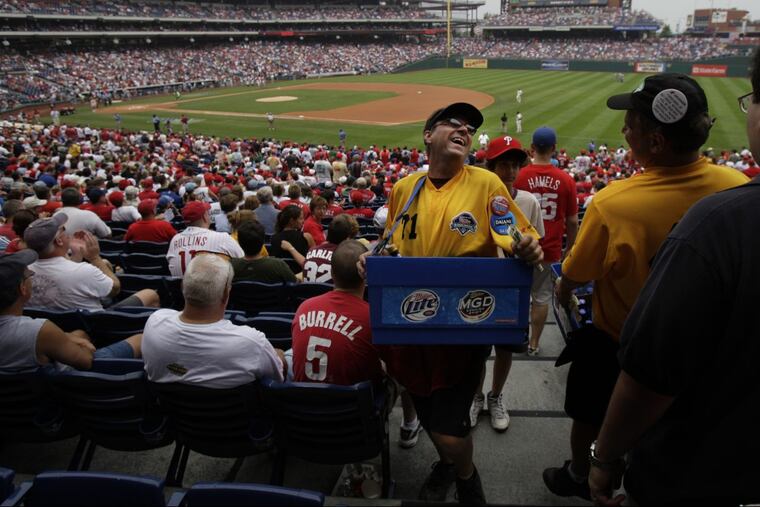Aramark workers plead for a pinch hit from the Phillies
"[We] are the people who are helping them make millions and billions of dollars. So why not help those who are helping you?”

Normally on a day like Monday, Aisha Johnson would get to Citizens Bank Park at 8 a.m. to start getting the place ready for that night’s game. The Blue Jays were supposed to be in for a brief two-game series. Tuesday was scheduled to be dollar hot dog night.
Those were the days.
Shortly after the sports world ground to a sudden stop last month, each major-league baseball team announced it was setting aside $1 million to help about 1,000 seasonal employees make ends meet during the COVID-19 crisis. The workers are paid for work only during specific games.
In announcing the fund, Phils managing partner John Middleton said it was a way to give employees “peace of mind as we navigate through this unprecedented time.”
Except that there is group of stadium workers for whom the fund did not apply.
Aramark handles food, beverage and other services for the three arenas at the stadium complex. As a subcontractor, it fields 800 workers for a typical Phillies game and as many as 1,200 for special events such as opening day or the postseason.
Johnson, a South Philly native and product of Audenried High, is a maintenance worker for Aramark. She cleans up concession stands and other facilities from the previous day’s game.
When there are no games, the Phillies don’t pay Aramark and Aramark doesn’t pay its workers.
“I think it’s just an oversight,” said Johnson, a representative for Local 274 of Unite Here. “I don’t want to blame the Phillies for anything. We work for Aramark, so I don’t blame the Phillies per se. But we are the people who are helping them make millions and billions of dollars. So why not help those who are helping you?”
Aramark’s chief executive, John Zillmer, told investors last month: “Our employees, if the operations are closed, typically are not paid." His firm’s stock climbed in mid-March after the firm issued a statement praising its “highly flexible, low fixed-cost operating model.”
In a statement Monday, the company said, “We continue to work closely with our partners, the union and government entities to lessen the impact on our associates and navigate this incredibly challenging situation." The statement provided no further details.
Aramark on April 1 announced it would be issuing furloughs and 25 percent pay cuts for its top executives.
A Phillies spokesperson on Monday said that “no final determination” has been made on whether to expand the fund to include subcontracted employees. The team has no contractural obligation to assist the workers.
"The maintenance department, the cooks, the [regular concessionaires] are the departments that these buildings need,” Johnson said. “You take the maintenance department. They need us to get the building cleaned and in order. You need the cooks to cook for the players and the fans.”
According to Forbes magazine, the Phillies had $94 million operating income (second best in baseball) on $341 million in revenue last year. Aramark’s 2019 gross income was $1.14 billion on $16.23 billion in revenue.
There is similar concern among workers at the Wells Fargo Center, where the Flyers and Sixers seasons were coming to an end when the virus hit. The Flyers had six regular-season home games remaining when play was halted. A deep playoff run could have meant another dozen. The Phillies play 81 home games in a regular season.
A few baseball teams have amended their initial $1 million funds to include subcontracted employees. The Giants kicked in an extra $700,000 after soliciting donations from team ownership and executives. The Boston Red Sox added $500,000 to specifically include third-party employees. They also have a subcontract with Philadelphia-based Aramark.
“The Aramark family is a central part of ours,” Red Sox president and chief executive Sam Kennedy wrote to employees, “and we are glad that these individuals will now benefit from this aid.”
Councilman Kenyatta Johnson, whose district includes the stadium complex, and other Council members sent a letter to the four pro teams, urging them not to forget about the Aramark workers during the historic stoppage of sporting events. He said on Friday that although he had heard back from the teams, nothing concrete was in place.
“The reality is what’s the willpower to actually make this type of investment,” the councilman said. “When this virus is over, you’ll have those workers coming back even more committed and dedicated to the operations of the sports teams. They’ll be even more enthusiastic.”
Local 274 president Rosslyn Wuchinich said the teams could afford to help.
The union members, Wuchinich said, "should not be treated as second-class citizens. These teams are incredibly well-resourced organizations — the Phillies alone are worth $1.8 billion — and it would mean a lot to these workers to get some financial support during this unprecedented crisis.”
To be sure, all the teams — and some of their players — have stepped in with various COVID-related donations elsewhere. On Friday, the Sixers and the Eagles each gave $1 million to Penn Medicine for virus research.
Aisha Johnson, who is not related to the councilman, worries about her colleagues who are in the most vulnerable spots.
“Not everybody qualifies for unemployment [assistance]. They aren’t getting any money at all,” she said. “Even if they could just pay those people, it wouldn’t be so bad.”